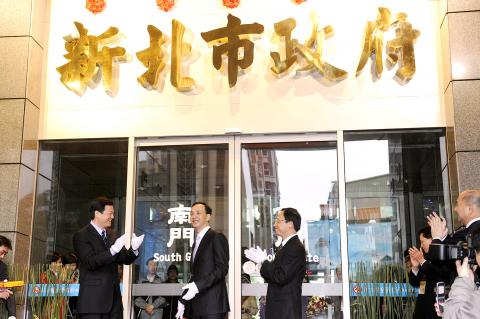Eric Chu (朱立倫) yesterday assumed the mayorship of New Taipei City (新北市, the proposed English name of the upgraded Taipei County) and proclaimed the end of Taipei County and the arrival of “the beginning of a new age.”
“Today marks the beginning of the new age in which New Taipei City will compete with the four other special municipalities in the country,” he said during the swearing-in ceremony.
“There will not be any holidays during my four-year term. Every day will be a workday as we strive for the development of New Taipei City,” he added.

PHOTO: GEORGE TSORNG, TAIPEI TIMES
Minister of the Interior Jiang Yi-huah (江宜樺) presided over the swearing-in ceremony and handed Chu the official seal.
Expounding on his administrative principles, Chu said the relationships between the city government and its residents, and the city government and the central government, will be relationships of partnership “in which [the city] will push for all kinds of development to create a win-win situation.”
Chu’s campaign platform included an aggressive plan to extend the MRT system, creating 10 new lines, including three circular networks. He has also promised New Taipei City residents that by 2020, construction would either have started or be completed on 80 new stations and 100km of new tracks.
During Chu’s inaugural ceremony, Amis Aborigines from the Sanying Aboriginal Community along Dahan River (大漢溪) were blocked by police as they attempted to petition the mayor.
Buses carrying the Aborigines were stopped blocks away from city hall, and they were not allowed to go near the event until after the mayor left.
Chu’s election as mayor has worried many Aboriginal communities along rivers in New Taipei City because he has a record of demolishing riverside Aboriginal communities since his tenure as Taoyuan County commissioner.
Meanwhile, the new special municipality has still not figured out what to call itself in English.
On Monday Chu announced that the city shall henceforth be known in English as “New Taipei City” because Sinbei means “new Taipei” in Chinese.
However, the move has been blocked by the Ministry of the Interior for the time being, as Deputy Minister of the Interior Chien Tai-lang (簡太郎) said the ministry would discuss the proposal with Chu at a later date.
Additional reporting by Loa Iok-sin

Alain Robert, known as the "French Spider-Man," praised Alex Honnold as exceptionally well-prepared after the US climber completed a free solo ascent of Taipei 101 yesterday. Robert said Honnold's ascent of the 508m-tall skyscraper in just more than one-and-a-half hours without using safety ropes or equipment was a remarkable achievement. "This is my life," he said in an interview conducted in French, adding that he liked the feeling of being "on the edge of danger." The 63-year-old Frenchman climbed Taipei 101 using ropes in December 2004, taking about four hours to reach the top. On a one-to-10 scale of difficulty, Robert said Taipei 101

Nipah virus infection is to be officially listed as a category 5 notifiable infectious disease in Taiwan in March, while clinical treatment guidelines are being formulated, the Centers for Disease Control (CDC) said yesterday. With Nipah infections being reported in other countries and considering its relatively high fatality rate, the centers on Jan. 16 announced that it would be listed as a notifiable infectious disease to bolster the nation’s systematic early warning system and increase public awareness, the CDC said. Bangladesh reported four fatal cases last year in separate districts, with three linked to raw date palm sap consumption, CDC Epidemic Intelligence

Two Taiwanese prosecutors were questioned by Chinese security personnel at their hotel during a trip to China’s Henan Province this month, the Mainland Affairs Council (MAC) said yesterday. The officers had personal information on the prosecutors, including “when they were assigned to their posts, their work locations and job titles,” MAC Deputy Minister and spokesman Liang Wen-chieh (梁文傑) said. On top of asking about their agencies and positions, the officers also questioned the prosecutors about the Cross-Strait Joint Crime-Fighting and Judicial Mutual Assistance Agreement, a pact that serves as the framework for Taiwan-China cooperation on combating crime and providing judicial assistance, Liang

US climber Alex Honnold left Taiwan this morning a day after completing a free-solo ascent of Taipei 101, a feat that drew cheers from onlookers and gained widespread international attention. Honnold yesterday scaled the 101-story skyscraper without a rope or safety harness. The climb — the highest urban free-solo ascent ever attempted — took just more than 90 minutes and was streamed live on Netflix. It was covered by major international news outlets including CNN, the New York Times, the Guardian and the Wall Street Journal. As Honnold prepared to leave Taiwan today, he attracted a crowd when he and his wife, Sanni,